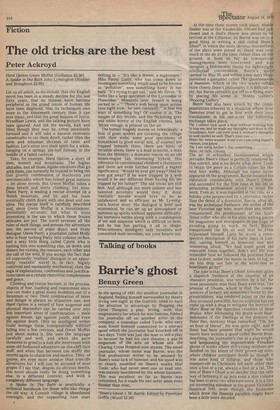Talking of books
Barrie's ghost
Benny Green
In the spring of 1891 the smallest journalist in England, finding himself surrounded by Henry Irving one night at the Garrick, tried to turn the situation to advantage by flogging the Great Thespian a play. Irving, with that. magnanimity for which he was famous, fobbed the journalist off on another actor in the company, a comedian called Toole, who very soon found homself committed to a one-act spoof which the journalist had knocked off in two days. Toole was just the man to sell a play to because he had his own theatre, a gas-lit emporium of the arts on whose site the Charing Cross Hospital now stands. The small journalist, whose name was Barrie, was the first professional writer to be amused by Ibsen's total lack of humour, and his spoof was, so closely modelled on lbsen's works that Toole, who had never seen one or read one, was entirely bewildered by the whole business. This was excellent so far as Barrie was concerned, for it made his one-acter seem even funnier than ever..
*Ibsen's Ghost J. M. Barrie, Edited by Penelope Griffin (Woolf £3.50)
At the time these events took place, Hedda Gabler was at the Vaudeville, Ghosts had just closed and A Doll's House was about to he revived at the Criterion. So Barrie was on to a good thing in writing a skit called Ibsen's Ghost*inimhich the more obvious mannerisms, of the plays were jeered at Ibsen was very much in the air at the time, rather than on the ground, at least so far as commercial managements were concerned, and was certainly a fashionable theme for lightweight ifilerectilaT converialibn-. Barrie 's Spoof opened on May 30, and within a few days Shaw published a pamphlet called The Quintessenceof Ibsenism. Which of the two works• reflect more closely Ibsen's philosophy it is difficult to say, but Barrie certainly got off to a flying start by placing his scene in "Hedda Gabler's Shooting Gallery".
Barrie had also been struck by the comic possibilities inherent in a situation where rival Ibsenites tried to get in first with their own translations; in his one-acter the following exchange takes place: nu: I cannot look upon a man' without wanting him to kiss me, and he reads my thoughts and does it. Oh Grandpapa, how can men read a woman's thoughts so well (aside) so well. That's your cue — Peter: No 'other women' is my cue. I am using Gosse's version, you know.
Tie: I am using Archer's. Say something.
Peter: All right. Ghosts, The air of schoolboy facetiousness which pervades Ibsen's Ghost is perfectly rendered by that extract, and is no doubt what drew Toole to retain the piece as a curtain-raiser far, the next four weeks. Although his name never appeared on the programme, Barrie boosted his reputation considerably with Ibsen's . Ghost, and succeeded for the first time in his life in persuading professional actors to stage his work. Even so, it was regarded at the time as holiday-joke perpetrated by a journalist rather than the debut of a dramatist. Barrie, after was the archetypal freelance, the writer of the later Victorian age who, more than any other, romanticised the predicament of the Grub Street trifler who sits in his attic writing pieces for magazines and newspapers in the hope of avoiding going to work. In fact, Barrie romanticised the life so well that he even hnotised himself. Later he wrote a retrospective description of his early days in London, casting himself as someone else and wondering aloud, "We had some good old miserable times together, didn't we? Do you remember how we followed the postman from door to door, under the moon, in rain, in fog, to see him drop our fate in the letter-box or heartlessly go by?"
The joke is that Ibsen's Ghost, knocked up by, a slapstick freelance at the expense of an obsessive pessimist, was written by a far, far more pessimistic man than Ibsen ever was. The premise of Ghosts, which is that the consequences of lechery are sometimes borne by the grandchildren, was rendered passé on the day they invented penicillin, but no scientist has yet come up with a drug to mitigate the horrors of Mary Rose or the merciless cruelties of Dear Brutus. After witnessing the death-wish blandishments of the Darlings at the pemiere of Peter Pan, Anthony Hope remarked, "Oh, for an hour of Herod". He was quite right, and if Ibsen had been present that night he would surely have written a spoof called Barrie Rose, describing the journalist's rise as a playwright, and lampooning the impenetrable Freudian gloom of works where still-young mothers are dandled on the knees of their grown-up sons, where children anticipate death as though it was some kind of lollipop, and those who masquerade as Christians tell each other that once a fool or a rat, always a fool or a rat. The text of Ibsen's Ghost is so slender that the only way of fattening it up into even a slim volume has been to print two alternate texts. It is a tiny yet interesting sideshow at the grand Victorian theatrical fete, eventhough -the footnotes which draw the Ibsenite parallels might have been a little more detailed.


































 Previous page
Previous page